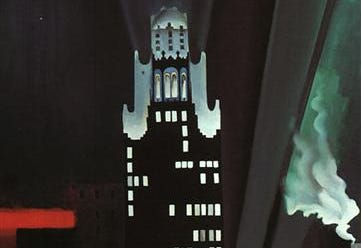“SEXUS DISGRACEFULLY BAD”
A short retrospective review of Henry Miller's Sexus
This morning I was thinking about Sexus, the first book in Henry Miller’s Rosy Crucifixion. It is the only volume I do not own, but my hardcover Grove Press editions of Plexus and Nexus are not too far from me, standing upright on the shelf. Every once in a while, I will pull out Plexus and read 50 pages like an old woman going over her smooth rosary beads. But I was thinking about Sexus specifically, about my first reading of it, how I savored (as one savors the sound of gurgling rainwater in the throat of a gargoyle) its evil, flowing, megalopolitan language, about reading it during a score of cold, bleak, wintry mornings, its darkly tight-knit text blocks, about walking through ice and slush to a cafe to read it over endless, stomach-cramp–inducing cups of coffee, but also about how wretched—a word I do not really use—how wretched of a book it was, but how I could still not put it down in all of its abject wretchedness. (Often, I had wanted to put Mr. Miller out of his misery as I read his Sexus. I wanted to put him up against the firing wall, have him banned all over again, yes, get this smut out of America: and Europe and Asia and South America and Africa too. Send Mr. Miller to Antarctica to languish with Dan Yack in the howling white darkness where nobody will ever be corrupted by the great honesty and power of his voice again.) But what? I read on, more and more, hating it, and grinning like an idiot the whole time at the Miller of Sexus, this juggernaut of anti-literary self-debasement, until his doubly sympathetic and humorous cruelty to the world and himself, was the main reason to keep going, to stomp through the slush, and post-up at the cafe, grinning and grinning.
Of all this, one of his closest correspondents and friends, Lawrence Durrell, says “It’s a joy to read you nevertheless, you bastard, even though I’m angry because I think you’ve failed yourself on this one,” but then a little later, in what seems to be a telegram, “SEXUS DISGRACEFULLY BAD WILL COMPLETELY RUIN REPUTATION UNLESS WITHDRAWN REVISED LARRY,” among other comically fainthearted exhortations.
Now—the end of Sexus, to my mind, is not one of the better endings to a book I have ever read: it is one of the only good ones. I won’t go on about what happens or how—it is only truly effective once you get there by the brackish path of the book on your own. Most endings are incidental, not unlike a person dying: the thing must end at some point, and this is just how it falls into—or out of—place, etc., etc. The endings of many of my favorite books are like this, which is okay. They are curt, irreversible accidents with inevitable conclusions: a wrong step out into traffic, a bite gone down the wrong tube with no one around, a seizure in the middle of the night, a toy left out on the top of a staircase, a stray bullet exploring the other side of the drywall—but not so with Sexus. No, the last page is an assassination and a sacrifice, a punctuating outburst, a literary Anstoss, a mark, a definitive break. It is deliberate, humorous, degrading, surreal; there is a laughing, black terror in it that throws the previous filth into real relief, exposing the hidden light behind this “disgracefully bad,” ruinous book that is, through a convoluted and dastardly dialectical trick, “a joy to read”.





